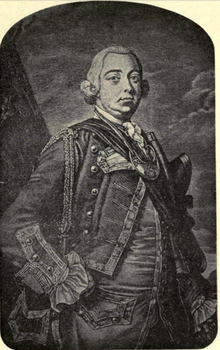Robert Monckton
| Robert Monckton | |
|---|---|

Robert Monckton by Thomas Hudson
|
|
| Born | 24 June 1726 Yorkshire, England |
| Died | 21 May 1782 (aged 55) |
| Allegiance |
|
| Service/branch |
|
| Years of service | 1741 - 1782 |
| Rank | Lieutenant-General |
| Unit | 3rd Regiment of Foot Guards |
| Commands held |
47th Regiment of Foot Commander of Fort Lawrence Commander of British expeditionary force to Fort Beausejour Second in Command to General James Wolfe at Quebec Commander of British forces in the southern provinces Commander of British forces capturing Martinique |
| Battles/wars | |
| Other work |
MP for Pontefract Lieutenant-Governor of Nova Scotia Governor of Province of New York Governor of Berwick-upon-Tweed Governor of Portsmouth MP for Portsmouth |
War of the Austrian Succession
Robert Monckton (24 June 1726 – 21 May 1782) was an officer of the British army and also a colonial administrator in British North America. He had a distinguished military and political career, being second in command to General Wolfe at the battle of Quebec and later being named the Governor of the Province of New York. Monckton is also remembered for his role in a number of other events in the French and Indian War (the North American theatre of the Seven Years' War), including the capture of Fort Beausejour, and the island of Martinique, as well as for his role in the deportation of the Acadians from British controlled Nova Scotia and also from French controlled Acadia (present day New Brunswick). The city of Moncton, New Brunswick, (about 50 km west of Fort Beausejour) and Fort Monckton in Port Elgin, New Brunswick are named for him.
Robert Monckton was the second son of Elizabeth Manners and John Monckton (later the first Viscount Galway) and, like many second sons of British aristocrats, he entered military service. He enlisted in 1741 at the age of 15 and received a commission in the 3rd Regiment of Foot Guards. He saw action in the War of the Austrian Succession, later staying on in Flanders after the bulk of the British Army had been recalled in 1745 to deal with the Jacobite Rebellion. He rose rapidly through the ranks, eventually becoming lieutenant colonel in charge of the 47th Foot in early 1752.
...
Wikipedia
